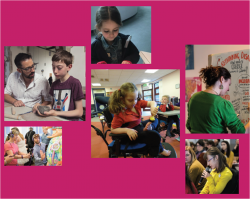Celebrating History of Place: Looking to the Future
Show or hide

Read our celebration document describing the achievements of our History of Place project over the past three years – and our plans to embed these successes in the cultural sector in the future.
As we come to the end of the three years of the History of Place project, we wanted to summarise all of its achievements as a guide to how we’ve evolved the telling of the story of deaf and disabled people in the cultural sector — and what needs to happen next to embed that progress.
You can read the whole celebration document by downloading it at the bottom of this page, but here are some stand out points:
- We have worked with 128 volunteers, delivered four digital experiences, made five films with deaf and disabled people, worked with 111 galleries, museums, archives, community groups and other partner organisations and recorded 31 oral histories.
- We also produced three flagship exhibitions and displays with MShed, the Museum of Liverpool and the Victoria and Albert Museum, London. These exhibitions aimed to be fully accessible and put the stories of deaf and disabled people front and centre.
- Of the 59 people we recruited to paid roles, 29 defined themselves as deaf or disabled. This is 49% compared to 19% in the general working population.
- We surveyed almost 600 people across our many events. Of these, 81% were more interested in disability history as a result of these events.
The document also looks at the challenges we faced. Some of these came from the practical implications of doing a new kind of work. These included hunting down the first person voices of deaf and disabled people in the archives, rather than only the voices of their gatekeepers from the past, which so often predominate. Since we wanted to create a completely inclusive project, we also had to make sure our outputs worked for everyone – for instance giving options for BSL and audio description for our digital experiences.
But societal prejudice is also an ever-present factor – sometimes voiced, sometimes not, but running through the lives of disabled people every day. Our project had to challenge these prejudices and show why they are flawed with charm, intelligence and dignity. Our evaluation – which shows a vast majority of those who we reached thinking more deeply about the history of disabled people – shows the good effects of our approach.
The Future: What Needs to Happen Next
From page 40, we outline our call to action describing what needs to happen next in the sector. Our many museum partners have been crucial in making exhibitions about deaf and disabled history front and centre at cultural venues – not tucked away as a tick box exercise in a back room. But for this work to become properly embedded there need to be curators and others in the museum workforce itself championing this topic. Current ACE figures show that only 2.6% of those working in arts and culture are disabled – vastly less than in the wider workforce.
Please do read our proposals for cultural policy makers, funders and museums and galleries. People we have connected with working in all of these roles are making a pledge to take up these issues, ensuring our work will be built upon, not lost.
If you would like to receive a hard copy by post then please email us at info@accentuateuk.org
Download AHOP Celebration Document PDF
Please contact us by emailing info@accentuateuk.org if you require this as a Word document.







Follow Accentuate on: